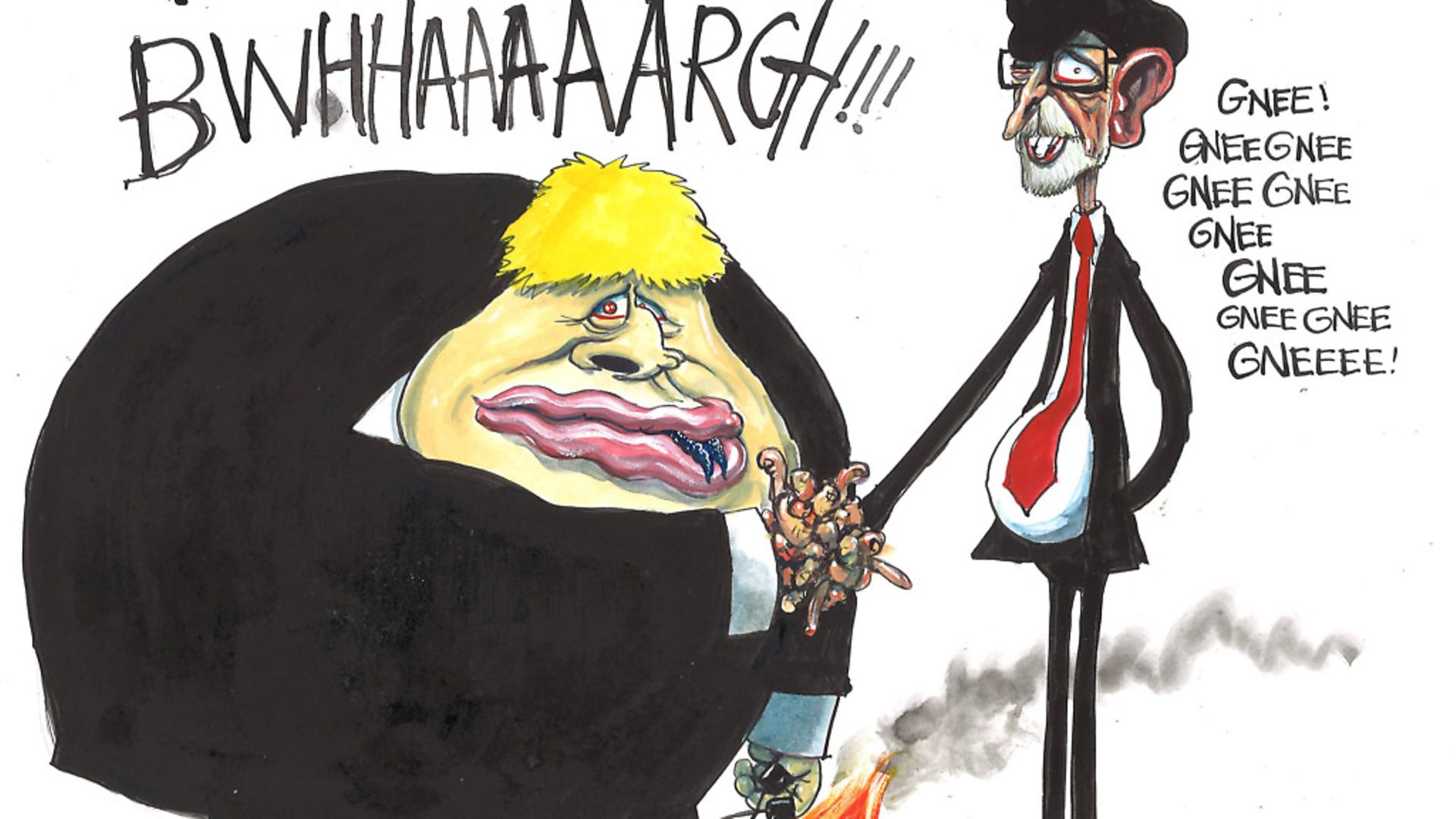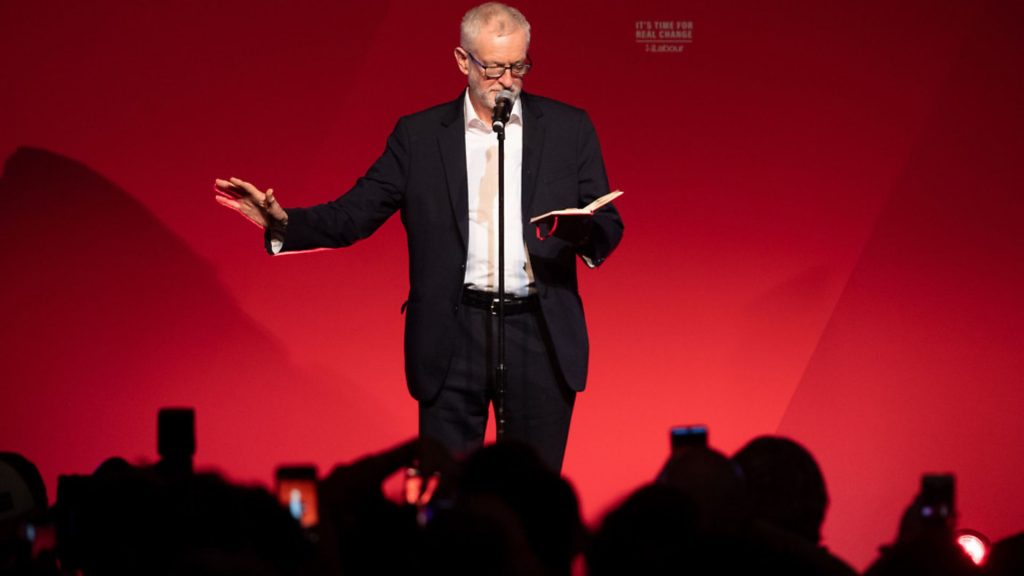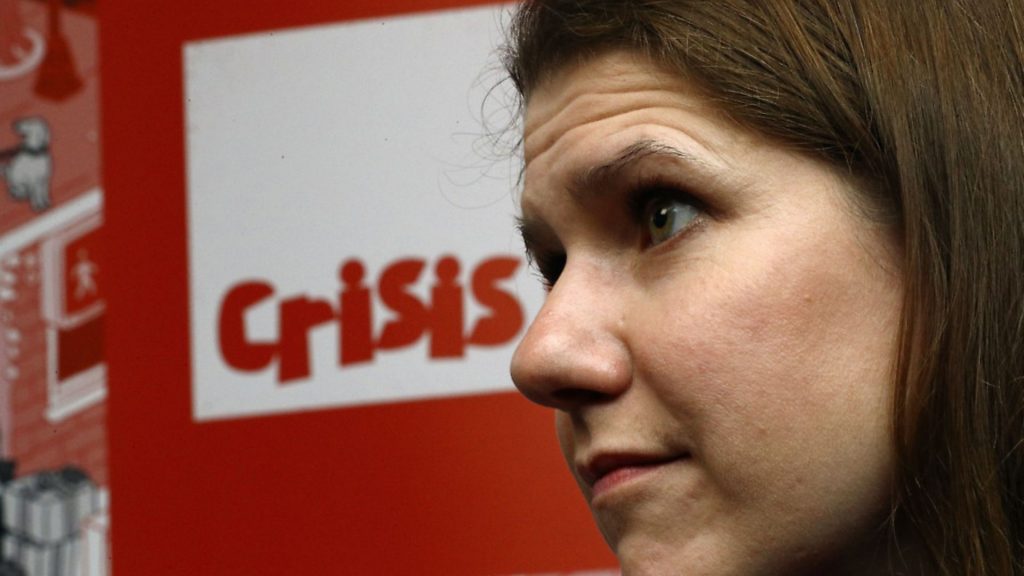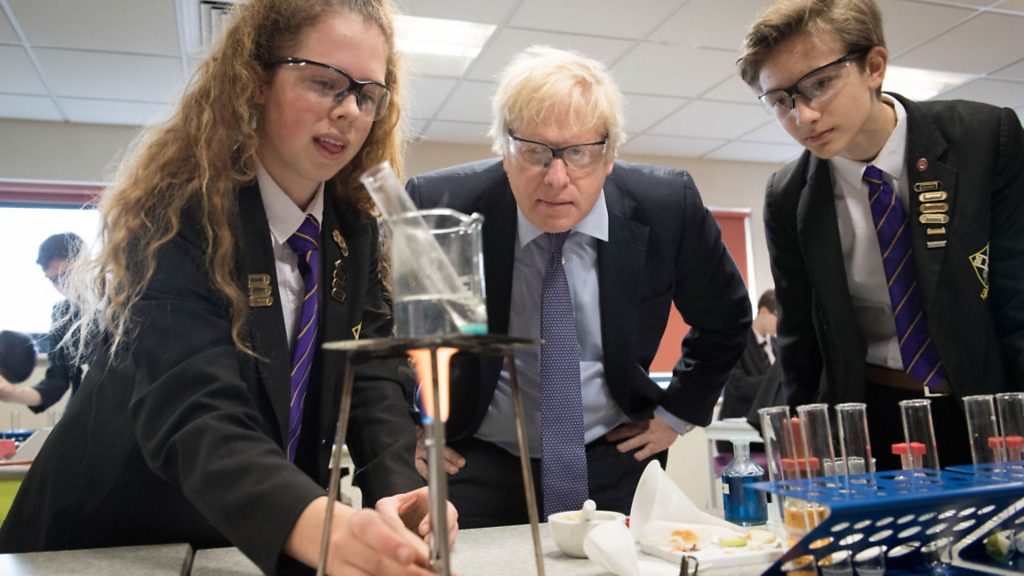
Amid the frenzy of the election campaign, MICHAEL WHITE finds it striking what the main parties are NOT addressing

Turning on the news for the latest Brexit election developments I heard instead that, if the Arctic ice melt takes the Greenland ice cap with it into the oceans of the world, then sea levels could rise seven feet. Or was it metres? It was metres. So the famous ‘Westminster bubble’ could quickly cease to be a problem. Not for the first time in this campaign I wonder if our politicians are getting their priorities right.
There again, most of the time the Bubble Crowd give the impression of being in way over their heads already in this, the strangest election I can recall in 60 years of watching them with varying degrees of attention. It’s not that tackling our addiction to fossil fuels and meat isn’t getting a bit more than token attention this time, I think it is. It’s just that we are still fiddling with essentially parochial problems instead of facing up to the existential threat to our survival. And it isn’t Brexit, hard, soft or revoked. Even Jeremy Clarkson has finally noticed.
With great respect to the Chief Rabbi, faith leaders like the Archbishop of Canterbury and the Reverend Andrew Neil, nor is Corbyn Labour’s poisonously ambiguous attitude towards some vicious anti-Semitism the election’s number one challenge. Corbyn was feeble on tax-and-spend and Brexit as well as on anti-Semitism when roughly interrogated by the BBC’s Neil on Tuesday night. But Sajid Javid’s feebleness about Islamophobia in Burqa Boris’ writing suggests that poison in the Tory DNA (where a strand of anti-Semitism lingers too) is arguably as serious. Rabbi Mirvis has unwisely allowed himself to be weaponised. Predictably the Muslim Council of Britain piled in with retaliatory complaints.
At a time of deep social divisions none of this is helpful to any of us. At least the Chief Heseltine was even-handed in his condemnation of both rascally leaders when he urged his followers to vote for Dominic Grieve-ites or Lib Dems. Archbishop Blair’s advice to vote for a hung parliament confirms he is singing from a near-identical hymn sheet, albeit more tactfully, as you might expect.

The bigger challenge in 2019 is posed by all forms of populist intolerance – including the liberal kind – which can so easily be spread via angry, unaccountable social media platforms, the modern equivalent of plague rat ships.
What an extraordinary state of affairs! No wonder so many voters tell the pollsters they are still undecided and the pundits are edging towards accepting what The New European’s writers have been saying for weeks. There are 650 local elections being fought here with a host of conflicting calculations competing to be uppermost when we each stand alone in the polling booth, stubby pencil in hand. What’s more, one million under-25s have registered to vote this month – 40% more than in 2017 – and no-one knows what they’ll do.
So national polls which mostly predict a 50-seat overall majority for the World King may prove a poor guide – again. They may also encourage wavering pro-Remain Tories that they can risk defecting without being saddled with prime minister Corbyn. That’s a gamble too, but one now being offset by bland assurances that a minority Corbyn government would be prevented from trying to implement its daftest policies – take your pick – by its own moderates and by the smaller parties on which it would depend.
Oh really? When I hear the SNP’s formidable Nicola Sturgeon playing hardball on all-UK TV (and being listened to south of the border for once) about that early second indy referendum and getting rid of Trident nuclear weapons on technical (they’re no longer undetectable) as well as moral grounds, I’m not persuaded. More important, I’m puzzled as to why the first minister is doubling down on utterances that could do to Corbyn what that Tory poster of Ed Miliband’s puppet in Alex Salmond’s breast pocket did to Labour in 2015.

It’s hard not to conclude that Sturgeon is concentrating on shoring up her local base on the referendum and seeking to appeal to traditional Labour voters who re-defected in 2017 and delivered seven Scottish seats instead of the one it held in the 2015 wipe-out. Neither Corbyn nor Boris Johnson seem to have played well with Scottish voters in their campaign forays north. Brexit or the Union is one of those conflicting calculations many of us are experiencing.
Who can blame Sturgeon when her bigger rivals are also jumping into the lifeboats. At a time of acute political and economic uncertainty what we are having to endure is the spectacle of rival parties offering us stockings full of goodies as if December 25 is being brought forward 13 days this year and the whole country can look forward to going on a credit splurge on someone else’s Platinum card. Not so much Black Friday, as black humour. Does anyone seriously believe this stuff? Only 20%, polls suggest.
At various points since parliament was prorogued, some policy announcement or mishap has made me think “Well, that’s it, it’s all over now.” As I wrote here last week I thought Jeremy Corbyn came across quite well in ITV’s Boris-Jezza interviews, as he did during Friday’s special edition of BBC Question Time when the four leaders – Sturgeon and “I’m with Jo” Swinson included this time – were quizzed by viewers one after the other.
Experienced Sturgeon is always impressive and benefits from English voters’ ignorance of Scottish matters. Forensic Scot, Andrew Neil, exposed her weak NHS record when she got the Corbyn treatment on Monday. I’m a fan of Neil’s, but wonder if under-25s will warm to his brutal style.
I also thought Swinson’s TV performances have been better than the media Rat Pack’s collective thumbs down. The World King remains a mystery. How does the shoddy fellow get away with it? One reason is relentless Fleet St cheerleading by the Sun and Express, the Borisgraph and Daily Mail, all of which can’t help but percolate into mainstream TV news, especially when the Chief Rabbi gives them all an opening. We don’t have to imagine what the tabloids would do to Mervis if he said “Don’t vote for dodgy Boris” because they do it to Archbishop Welby whenever he expresses ill-ease about the kind of growing poverty that the Resolution Foundation report highlighted this week.
A routine part of its elections package, the Mail ran a shamelessly slanted piece on midlands and northern marginals. You had to read it very hard to realise that both Tory and Labour had dipped slightly, but the Lib Dems had almost doubled their prospective vote share – from 7% to 13%. It’s not the stuff of victory, but who knows on the night? Team Swinson is now soft-pedalling its “Revoke Article 50” pledge. Unheroic, but it may be sensible because its campaign USP is apparently proving unpopular on the doorstep.
Notwithstanding compromises on climate change targets (“aims” not “binding” ones), immigration, abolishing Eton (etc), Labour’s “manifesto for hope” strikes me as confirming the suspicion that it expects to lose – as Team Corbyn expected to do last time (and did). So it has opted for purity over power, to prioritise retaining control of the post-Corbyn party over winning the election and trying to make good some of its pledges to the electorate. This is 2017 on steroids.
By its own admission the manifesto would cost £82.9 billion in extra taxes by 2024 – extra borrowing is subject to new accountancy tricks – even before the unexpected weekend announcement that ‘Waspi’ women, those born in 1950-60 who got their pension age ratcheted up with insufficient warning, would get a one-off ex gratia payment at a cost of £58bn (also borrowed).
It’s an odd sort of after-thought, rumoured to have been brought forward against John McDonnell’s advice for media headline reasons to offset Sunday’s Tory manifesto launch.
It’s also odd that the proposal is universal, not targeted on lower earners, so that Theresa May will be eligible for £21,000. Odder still that it amounts to a generational transfer from the young – who will have to pay off the loan on top of their student loans and (if lucky) mortgages – to help the babyboomer generation. It’s obviously an election bribe, perhaps to demonstrate that Team Corbyn is not misogynistic, but is it fair and is it credible? When Corbynistas talk of a “moral debt” to repay “theft and robbery” they are digging themselves into a trap for their own confiscatory plans.
Economic analysts, usually led by Paul Johnson of the Institute for Fiscal Studies (IfS), were startled and near-unanimous that the shadow chancellor’s numbers can’t be made to work so that 95% of voters won’t pay for those popular extra services. For a host of reasons, including working less (as NHS consultants have reminded us), the 5% of higher earners – those on £80,000 or more – won’t and can’t be made to carry the burden. In a mobile world, corporations have even more options to avoid doing so without even passing the costs on to the rest of us. Corbyn admitted as much to Andrew Neil.
That’s not to say it’s all nonsense. Stronger regulatory intervention in the over-heated rented homes market and more low-income house-building are clearly needed, though Labour would be wise to proceed with more caution than proposed this week, even by sensible John Healey, a holdover from the UnPersons Blair, Brown and Miliband era. It will appeal more to young renters than the “£20 grand for Theresa” policy. But it’s also possible to make a bad situation worse. The ‘good old days’ of rent control weren’t that great.
I was also struck by the effort which some technocratic commentators were made to endorse Labour concerns without always backing Labour remedies. The IfS’s Johnson – often unfairly targeted as being a closet Tory for bringing bad news – devoted a whole Times column to saying that a careful increase in higher earners’ taxes (they already pay more than half UK income tax) would help ease inequality. As for Labour’s plans to realign capital gains tax (CGT) and dividend taxes with income tax, both are useful reforms. Whether they would generate the predicted tax receipts is another matter, he warned.
In fairness to the technocrats, Paul Johnson and his kind were also pretty scathing about Sunday’s Conservative manifesto launch – though the declared modesty of its ambitions was intended to show realism and restraint compared with Labour’s bulging Christmas stocking, a £3bn increase in current spending compared with McDonnell’s £83bn. Yet all that extra spending (much of it pledged last year) on the NHS – a tactical move to reassure would-be Labour defectors in the heartlands – schools and the rest, amount to “a misleading narrative”, says Johnson. Why? Because the manifesto couples the spending with a ‘triple lock’ that denies any increase in rates of income tax, national insurance or VAT.
Since over 60% of tax revenues are raised by those three, chancellor-in-name-only Sajid Javid won’t have much scope for initiative in the years ahead, except to gouge us via ‘stealth taxes’ (copyright George Osborne) or to break Boris’s triple lock promise.
Breaking promises is what Boris does. All the same this was billed as a ‘safety first’ manifesto that would not sink the fragile Tory vessel in choppy waters ahead – unlike 2017. That’s why Jacob ‘Common Sense’ Rees-Mogg has been locked in the Oliver Letwin Memorial Coal Cellar for the duration.
It has also meant the party parking the challenge of reforming social care of the elderly – unless No.10 secretly plans to relocate our beds in global warming’s flood zones when we pass 80. The Brexit challenge? Did anyone mention Brexit? No, not you, Jeremy, you have finally come out as ‘neutral’ on whatever outcome the quick-fire EU deal you promise delivers in time for a second referendum in mid-2020.
As the old joke goes, he used to be indecisive, but now he’s not so sure. Pro-Remain voters and those willing to settle for a softer form of Brexit will have differing views on the Labour leader’s manoeuvre. But Radio 4’s News Quiz panel could hardly have done better justice to the policy.
Yet the Tories’ idea of a ‘Get Brexit Done’ by the end of 2020 is hardly ‘safety first’. Not since the near-death of Tinkerbell at the end of Peter Pan have so many voters been required to say “We believe in fairies”. Even dissemblers as hardened as Michael Gove struggle to sound convinced by the existence of the Brexit Fairy. TinkerBrexit must persuade the new EU commission in Brussels, nervous and inexperienced, to come up with a reputable free trade deal that protects British interests in just a few months. It must then do the same with other major trading partners in three years. Only craven concessions made out of weakness make that timetable remotely likely.
The Tories mock Labour’s fantasy renegotiation, but theirs is little different. As we already know – but many of us chose to forget – Johnson’s magic renegotiation of May’s Withdrawal Agreement (“they said it couldn’t be done”) is proof that they were right: It couldn’t. What we got was largely a make-over. The danger has been obvious for weeks: That when the time comes to seek an extension to the transition in mid-summer, Johnson will be tempted not to do so; nor be forced by the Commons to do so either, if he has a hard Brexit-compliant backbench majority braying behind him.
Unpredictable events in an unstable world – what price a crisis somewhere in East Asia or the rudderless Middle East? – may impact on the process. Don’t forget, Johnson’s tax-and-spending plans depend on the second half of his manifesto’s title, “Unleash Britain’s Potential”, as well as on the first (“Get Brexit Done”) half, on healthy GDP growth as well as trade deals. Did someone mention the climate summit in Madrid? Don’t mention the climate emergency when you’re talking up growth.
Predictable events pile in too, the current strike among university lecturers, the looming trouble on the railways over Christmas, both potentially bad news for Corbyn who likes to stand by troubled friends and allies as keenly as Prince Andrew. But are we missing the biggest elephant in this year’s Advent Calendar? On December 3-4 the annual Nato summit, its 70th anniversary gathering, is taking place – and it’s being staged in the UK.
So there’s no way we can avoid or sideline another Trump visit just before polling day. The president has well-deserved woes of his own and a familiar list of grievances he is unlikely to keep quiet about.
He’s likely to make inappropriate remarks in support of his pal, Boris. Thirsty Nigel Farage will be desperate for some personal publicity too. Reporters will ask awkward questions. Whether or not Trump knows that Pal Boris has said “the NHS is off the table” in any US-UK trade talks, he’s unlikely to resist attacking the NHS and promoting the demands of the US pharmaceutical industry for higher prices than the NHS’s purchasing monopoly currently prevents.
Trump doesn’t do loyalty except to dictators to whom he may owe money. It’s a potential nightmare for the World King. Serves him right.









